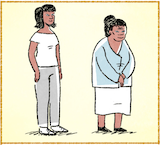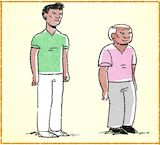

นี้คืออี่หยัง นี้คือพุหญิง มีพุหญิงสองคน
มีพุหญิงพุหนึ่ง อายุบ่ทันได้หลาย แต่ว่ากะอาดสิเป็นวัยทองอยู่ ใส่เสี้ยแขนสั้นสีขาว ใส่ส้งขาญาวสีเทา เขากำลังยืนอยู่ ยืนอยู่ข้างๆ อีกพุหนึ่ง
พุหนึ่งเบิ่งซงแล้วคือสิเถ้าหลาย อาดสิเป็นพุเถ้า เพาะว่าเบิ่งซงแล้วคือสิเถ้าบักคักหนึ่ง กำลังก้มหน้าก้มตาอยู่ ใส่เสี้ยแขนญาวสีฟ้า
พุหญิงสองคนนี้ พุใดเถ้ากว่ากัน กะสิมีคนหนึ่งเถ้ากว่า คนที่ยืนอยู่ฝั่งขวา แล้วคนยืนอยู่ฝั่งซ้าย กะสิอายุหน้อยกว่า
10
นี้คืออี่หยัง นี้คือคน คนสองคนยืนอยู่ เป็นพุซายสองคนยืนเฮียงกันอยู่
พุซายคนแลกอายุหน้อยๆ หนึ่ง บ่ทันได้เถ้า อายุทันได้หลาย ใส่เสี้ยแขนสั้นสีเขียว ใส่ส้งขาญาวสีขาว กำลังยืนเฮียงกันอยู่
เบิ่งซงเบิ่งหุ่นแล้ว กะสูงเติบ กะเป็นคนสูงเติบ เบิ่งซงเบิ่งหุ่นแล้ว กะสูงเติบ กะพอสูงใคแน่ มีผมสีดำ ผมกะบ่ญาวหลาย
พุซายอีกพุหนึ่ง คือสิเถ้าแล้ว เบิ่งซงคือสิเถ้าคัก
เขามีผมหงอกพ้อม ผมหงอกสีขาว หัวเขากะล้านพ้อม ล้านบักคักหนึ่ง หัวล้านเหมิกเถิกอยู่
เขากะใส่เสี้ยสีซมพูแขนสั้น แล้วกะใส่ส้งขาญาวสีเทาคือกัน
สองคนนี้พุใดสูงกว่ากัน คนใส่เสี้ยสีเขียวสูงกว่า เขาเป็นวัยลุ้นอยู่ เขากะทันได้เถ้า เขาสูงกว่า
แล้วพุใดเถ้ากว่ากัน กะมีพุเถ้าพุหนึ่ง ยืนอยู่ฝั่งขวา เบิ่งซงแล้วกะเถ้าคัก คือสิเถ้ากว่าเด็กน้อยคนนี้อยู่
Link to overview page
Link to dictionary
| Isaan | Pronunciation | Tones | Thai | English/Notes |
|---|---|---|---|---|
| นี้ | ni: | HF | นี้ | 1. this 2. here |
| คือ | khʉ: | HR | คือ | 1. to be, to resemble, like, as 2. why {บักหล้าคือบ่เก็บโต่ะแน่ = [addressing a young boy] Why haven't you cleared the table?} |
| อี่หยัง | i:-yaŋ | H-M | อะไร | 1. what {นี้คืออี่หยัง = What is this?} {มื้อนี้เจ้าเฮ็ดอี่หยัง = What are you doing today?} {กินเข้างายกับอี่หยัง = What did you have for breakfast?} 2. something, anything, (in negations) nothing {บ่ต้องเฮ็ดอี่หยังอีกเลยนอกจากใส่ปุย = [we] don't need to do anything besides adding fertilizer} |
| พุหญิง | phu-ɲiŋ | H-M | ผู้หญิง | woman, female |
| มี | mi: | HR | มี | 1. to have 2. there is |
| สอง | sɔ:ŋ | M | สอง | two |
| คน | khon | HR | คน | person, people |
| พุ | phu | H | ผู้ | 1. person 2. clf. for people {พุหญิงพุหนึ่ง พุซายพุหนึ่ง = a woman, a man} {ซู่พุซู่คน = everybody} {พุหนึ่งโตจ่อยๆ พุหนึ่งโตบักอ้วนหนึ่ง = one person is slim, the other is fat} Notes: pronunciation: also realized as พู่- |
| หนึ่ง | nʉŋ | H | หนึ่ง | 1. one 2. after adjective: intensifier {บักคักหนึ่ง = very much} {อันบักใหญ่หนึ่ง = very large}, or attenuates the meaning {กะดาดมันแผ่นน้อยๆ หนึ่ง = the piece of paper is [relatively] small} |
| อายุ | a:-yu | M-H | อายุ | age, to be ... years old |
| บ่ทันได้ | bɔ:-than-dai | H-HR-HF | ยังไม่ได้ | not, not yet {บ่ทันได้กินเข้า = [I] haven't eaten yet} {อายุบ่ทันได้หลาย = not yet old} {เขาอาดสิบ่ทันได้เถ้ากะได้ = maybe he's not yet (that) old} Notes: see also ทันได้ which is apparently equivalent |
| หลาย | la:i | M | เยอะ, มาก | many, much, very |
| แต่ว่า | tɛ:-wa: | H-H | แต่ว่า | 1. but 2. only {ฮู้แต่ว่าเขายืนอยู่พุเดียว = I only know that he's standing there by himself} |
| กะ | ga | M | ก็ | 1. then, consequently 2. also |
| อาด | a:t | LF | อาจ | 1. might, may, will 2. likely |
| สิ | si | M | จะ | future tense auxiliary {เขากำลังสิตื่น = he's about to wake up} {สิไปตะหลาด = [I'm] going to the market} |
| เป็น | pen | M | เป็น | 1. to be, to exist 2. to be able to 3. to suffer, sth. happens to 4. เป็นหญัง[...]คือ in initial position: why? {เป็นหญังเขากะคือแปงฟัน = Why is he brushing his teeth?} {เป็นหญังเคี่ยงบินมันคือสิตก = Why is the airplane falling down?} |
| วัยทอง | wai-thɔ:ŋ | HR-HR | วัยทอง [?] | to be middle-aged Notes: seems to be describe a younger age than Thai วัยทอง = elderly |
| อยู่ | yu: | H | อยู่ | 1. to be (located) at 2. yet, still 3. auxiliary indicating continuous or progressive action {ทอดปาอยู่ในกะทะ = (in the process of) frying a fish in the pan} {แม่กำลังเมี้ยนเฮียนอยู่ = mother is cleaning/tidying up the house} |
| ใส่ | sai | H | ใส่ | 1. to put something in/on {เขาใส่บักพิกในกวยเตียวหลาย = he's putting a lot of chili in his noodle soup} {เขาบีบยาสีฟันใส่แปงสีฟัน = he squeezes toothpaste on the toothbrush} {ก่องเอาไว้ใส่ของ = boxes are there to put stuff in} 2. to wear (clothes) {เขาใส่เสี้ยแขนญาว = he's wearing a long-sleeve} 3. directed at {เอิ้นใส่กัน = to call each other/to say to each other} {หมามันเห่าใส่แมว = the dog barks at the cat} {ล้องเพงใส่ไม = to sing into the microphone} {เขากำลังซี้มือไปใส่พุซาย = she's pointing at the man} |
| เสี้ย | si:a | LF | เสื้อ | shirt |
| แขน | khɛ:n | M | แขน | arm |
| สั้น | san | LF | สั้น | short |
| สี | si: | M | สี | 1. color 2. colored pencil, crayon |
| ขาว | kha:o | M | ขาว | white |
| ส้ง | soŋ | LF | กางเกง | trousers Notes: synonym: กางเกง |
| ขา | kha: | M | ขา | leg {ขาหน้า = front leg} {ขาหลัง = hind leg} {ส้งขาญาว = long trousers} |
| ญาว | ɲa:o | HR | ยาว | long |
| เทา | thao | HR | เทา | grey |
| เขา | khao | M | เขา | personal pronoun: he, she |
| กำลัง | gam-laŋ | M-HR | กำลัง | auxiliary indicating continuous or progressive action |
| ยืน | yʉ:n | M | ยืน | to stand |
| ข้าง | kha:ŋ | LF | ข้าง | 1. side {มีหูจับสองข้าง = there are handles on both sides} 2. next to {วางอยู่ข้างๆ ก่องใบใหญ่ = it's placed next to the large box} {เขายืนอยู่ข้างๆ อีกพุหนึ่ง = he's standing next to another person} 3. clf. for body parts which come in pairs (eyes, ears, legs etc.) {เขามีตาสองข้าง = she has two eyes} |
| อีก | i:k | LF | อีก | 1. more, again 2. other, another |
| เบิ่ง | bəŋ | H | ดู | 1. to look at, to see, to watch {เบิ่งโทละทัด = to watch TV} {เบิ่งหนัง = to watch a movie} 2. to guess {เบิ่งซงแล้ว ... = [I] guess / from what it looks like ...} |
| ซง | soŋ | HR | ทรง | 1. shape, form 2. as if, like Notes: translation to be confirmed |
| แล้ว | lɛ:o | HF | แล้ว | 1. finished 2. already 3. and then, and next (especially แล้วกะ) 4. auxiliary for past tense |
| เถ้า | thao | LF | แก่, เฒ่า | age: old |
| พุเถ้า | phu-thao | H-LF | ผู้เฒ่า | old person |
| เพาะว่า | phɔ-wa: | H-H | เพราะว่า | because |
| บักคักหนึ่ง | bak-khak-nʉŋ | M-H-H | intensifier: very, very much (variant of คัก) | |
| ก้ม | gom | HF | ก้ม | to bend down, to stoop |
| หน้า | na: | LF | หน้า | 1. front {ปะตูหน้า = front door} 2. face {เขากำลังล้างหน้า = he's washing his face} 3. auxiliary: conditional tense {เขาหน้าสิเป็นพุบ่าวพุสาวกัน = they are probably groom and bride} {กะหน้าสิส้มอยู่ = it's likely to be sour} 4. season {หน้าฮ้อน = hot season} 5. page 6. clf. for pages {เฮาอ่านฮอดหน้านั้นแล้ว = we've read until this page} |
| ตา | ta: | M | ตา | eye {เขามีตาสองข้าง = he's got two eyes} {หลับตา = to close one's eyes} |
| ฟ้า | fa: | HF | ฟ้า | 1. sky {เคี่ยงบินมันกำลังบินขึ้นฟ้า = the airplane is taking off into the sky} 2. color: blue |
| พุใด | phu-dai | H-M | ใคร | 1. who {มีพุใดโทมากะบ่ลู้ = I don't know who has called} {ห้องนอนของพุใด = whose bedroom (is this)? } 2. someone, somebody, anybody, in negative context: nobody {บ่มีพุใดอยู่กับเขาเลย = there's nobody with him} |
| กว่า | gwa: | H | กว่า | more, more than, comparative: as, than |
| กัน | gan | M | กัน | mutual, each other, with another, together {เขากำลังนั่งเว้ากัน = they're sitting and talking} {เขาสองคนฮักกัน = they love each other} {ปาสองโตนี้ ใหญ่ห่างกันหลายบ่ = These two fish here, are they very different in size (from each other)?} {ต่างกัน = to be different (from each other)} {ก่องอันไหนหนักกว่ากัน = Which box is heavier (than the other(s))?} |
| ที่ | thi: | H | ที่ | 1. that, which {คนที่ยืนอยู่ฝั่งขวา = the person which is standing on the right = the person standing on the right} {เว้าคำที่บ่สุพาบ = to speak words which are impolite = to speak impolitely} 2. for ordinal numbers {ที่สาม = third} |
| ฝั่ง | faŋ | H | ฝั่ง | 1. side 2. river/canal bank, shore |
| ขวา | khwa: | M | ขวา | right |
| ซ้าย | sa:i | HF | ซ้าย | left |
| หน้อย | nɔ:i | LF | น้อย | 1. a little/some 2. not long |
| พุซาย | phu-sa:i | H-HR | ผู้ชาย | man, male |
| เฮียง | hi:aŋ | HR | เรียง | 1. to line up, to stand in a row {มีพุซายสามคนยืนเฮียงกันอยู่ = three men are standing in a row} 2. to arrange Notes: see also เลียง |
| แลก | lɛ:k | HF | แรก | first {ตอนแลก = at first} {พุซายคนแลก = the first man} {มื้อแลก = the first day} |
| ทันได้ | than-dai | HR-HF | ยังไม่ได้ | not, not yet {มันทันได้เกิดขึ้น = it hasn't happened yet} {หัวหนึ่งทันได้ปาด = one [onion] hasn't been cut yet} {หมามันจับแมวทันได้ได้ = the dog hasn't been able yet to catch the cat} {เขากะทันได้เถ้า = he's not yet old} Notes: equivalent to บ่ทันได้ |
| เขียว | khi:ao | M | เขียว | green |
| หุ่น | hun | H | หุ่น | 1. figure 2. puppet |
| สูง | su:ŋ | M | สูง | high, tall |
| เติบ | tə:p | LF | intensifier: very, much {เว้ากันโดนเติบ = to talk a long time} | |
| พอ | phɔ: | HR | พอ | 1. just when, just after, as soon as 2. enough, adequate |
| ใคแน่ | khai-nɛ: | HR-H | ก็ดี | {พอสูงใคแน่ = [Thai] ก็สูงพอดี = tall, appropriately tall, nicely tall} Notes: ใคแน่ by itself: [Thai] ดีขึ้น = better |
| ผม | phom | M | ผม | hair |
| ดำ | dam | M | ดำ | 1. black 2. to transplant rice seedlings {ดำนา = to transplant rice seedlings} |
| บ่ | bɔ: | H | ไม่ | 1. no, not 2. question particle, transforming a statement into a question Notes: spelling exception in line with common usage on social media |
| คัก | khak | H | intensifier: very, very much | |
| หงอก | ŋɔ:k | LF | หงอก | color of hair: white, grey {ผมหงอกสีขาว = white hair} |
| พ้อม | phɔ:m | HF | พร้อม | at the same time, also, too {มีตะเว็นพ้อม = the sun's out, too} {กะทะมีด้ามพ้อม = the pan has also a handle} |
| หัว | hu:a | M | หัว | 1. head 2. clf. for onions, bulbs of garlic |
| ล้าน | la:n | HF | ล้าน | bald {เขาหัวล้าน = he's bald} |
| เหมิกเถิก | mə:k-thə:k | LF-LF | used with ล้าน to intensify meaning {หัวล้านเหมิกเถิกอยู่ = he's pretty bald} | |
| ซมพู | som-phu: | HR-HR | ชมพู | pink |
| คือกัน | khʉ:-gan | HR-M | เหมือนกัน | 1. also, likewise, similarly {ยินดีที่ได้ฮู้จักคือกันคับ = Nice to meet you too!} 2. in negative sentences: either {บ่ลู้คือกัน = I don't know either} {จักคือกัน = I don't know (either)} |
| วัยลุ้น | wai-lun | HR-HF | วัยรุ้น | teenager, adolescent |
| เด็กน้อย | dek-nɔ:i | M-HF | เด็ก, เด็กน้อย | child |